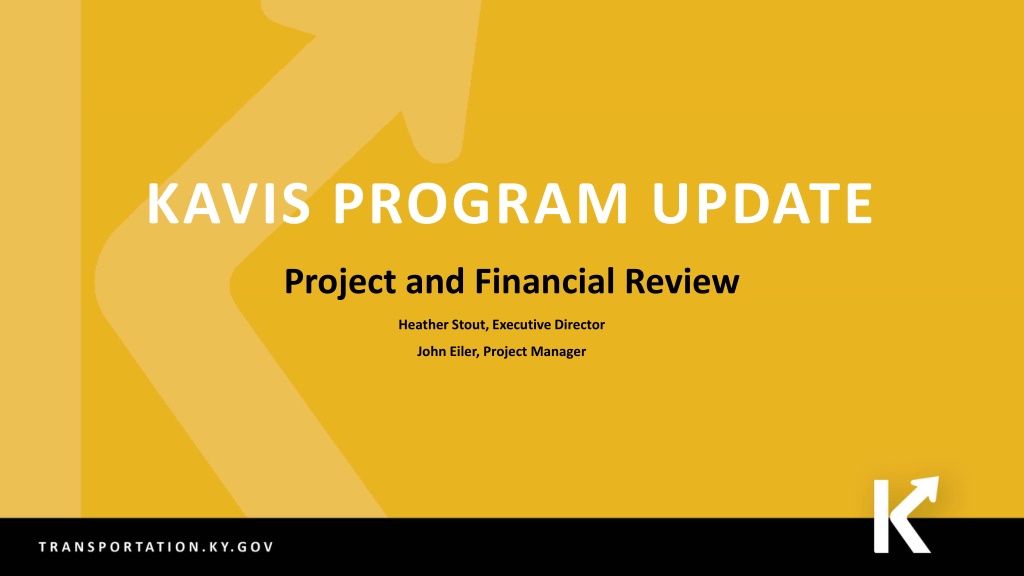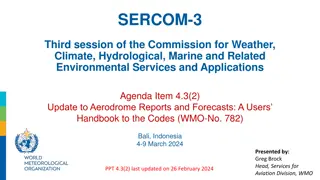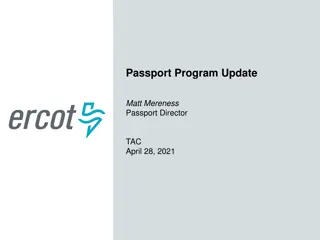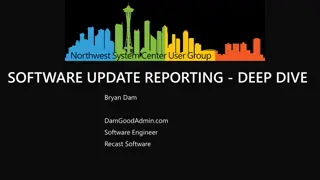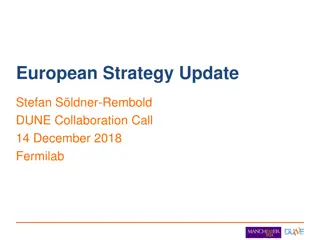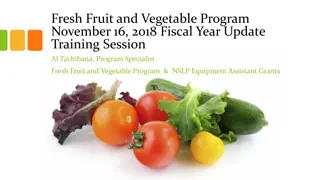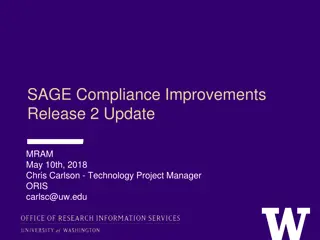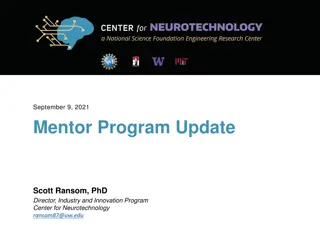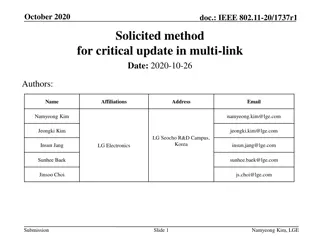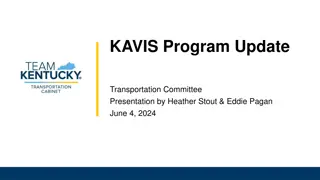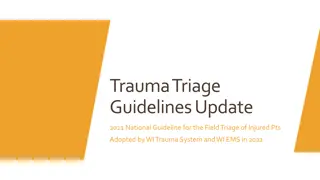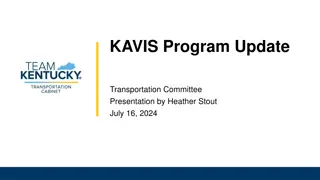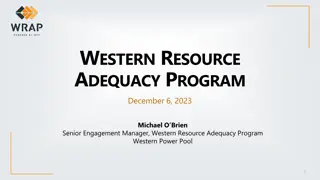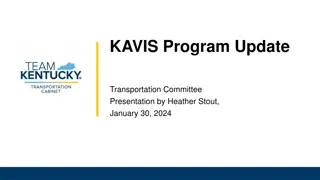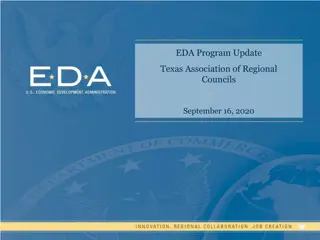KAVIS PROGRAM UPDATE
KAVIS Program Update and Financial Review including project updates, status overview, and project implementation details for the KAVIS:2 system which aims to provide the Commonwealth with a comprehensive vehicle and boat titling solution, enhancing efficiency and customer service.
Download Presentation

Please find below an Image/Link to download the presentation.
The content on the website is provided AS IS for your information and personal use only. It may not be sold, licensed, or shared on other websites without obtaining consent from the author.If you encounter any issues during the download, it is possible that the publisher has removed the file from their server.
You are allowed to download the files provided on this website for personal or commercial use, subject to the condition that they are used lawfully. All files are the property of their respective owners.
The content on the website is provided AS IS for your information and personal use only. It may not be sold, licensed, or shared on other websites without obtaining consent from the author.
E N D
Presentation Transcript
KAVIS PROGRAM UPDATE Project and Financial Review Heather Stout, Executive Director John Eiler, Project Manager
KAVIS Program Status KAVIS Program Status Overview of the areas we are going to discuss Project Update Present and Future Modules Value Driven Delivery Creating the Solution they need Impact to Citizens Approach Iterative and Incremental Delivery Budget Review Benefits Implementations Spend Burn down Financial Breakout Partnerships with End Users Solving the Right problems
KAVIS OVERVIEW Project Update The KAVIS:2 project will provide the Commonwealth with a statewide, automated system for vehicle and boat titling, registration, taxation and related functions. This comprehensive solution will replace the legacy AVIS and BTR systems, other small subsystems, and provide a consistent and updated platform for the Commonwealth to perform vehicle licensing business. The replacement of the AVIS and BTR systems will streamline and improve efficiencies within the Department of Vehicle Regulation, the Division of Motor Vehicle Licensing, and county clerks offices throughout the state. It will also allow the KYTC, Department of Revenue (DOR), County Clerks, Property Valuation Administrators (PVA), and other agencies to better serve the citizens of the Commonwealth. The KAVIS:2 system will be designed using a customer-centric paradigm, moving from the current vehicle centric model that exists in the AVIS and BTR systems. Establishing a customer-centric system and business model will support moving from the current plate-to-vehicle model to a plate-to- customer model. The current AVIS and BTR systems cannot support this concept.
PROJECT IMPLEMENTATION Project Update Print on Demand Decal & Real Time Scanning - May 2015 Immediate Access to Documents by multiple agencies Decrease time in office for customers Eliminate double entry of data for clerks Reduce paper handling and archiving Decrease maintenance of aging printers Reduce postage for clerks and MVL Reduce annual audit time Greatly improve access to vehicle documents Web Renewal Enhancement Phases (2015 and 2016) New web renewal site deployed Summer 2015 Enhanced usability through design improvements Clerks receive money collected immediately All eligible plates renewable online (Mid-year 2016) Streamlined process for clerks to approve renewals (EOY 2016)
PROJECT IMPLEMENTATION Project Update Disabled Placard-Complete January 2016 Transition to a Web Based Application Solution Shift from vehicle centric model to Customer Centric Model Hardware and software implementations to drive accuracy and precision of data DL Verification (integration between DL and KAVIS) Vehicle Foundation Boats July 2019 Framework Application Functionality Title, Registration, Ad Valorem, Liens etc. Increased End Users-Clerks, MVL, KSP, F&W, DOR, PVA and Audit Decommission and Implement Inventory Solution-July 2021 State-Wide Point of Sale Solution-Complete March 2018 Stable, reliable and consistent environment Support revolves around bookkeeping, reports and normal operations with AVIS processes and procedures Enable use of automated cash drawers Print on Demand Boat Decal Implement Flat Plate Solution-July 2021 Module All Vehicles-Target Dec 2022 Decommission AVIS legacy Mainframe Transition all remaining vehicle types (data, business processes and functionality) to KAVIS
KAVIS IMPACT AND BENEFITS Project Update DataIntegrity Ability to scan Driver s Licenses to ensure data validity and accuracy Access to 5 years worth of data versus 1 year Reduction in Fraud-KAVIS requires correct customer and vehicle data as well as pointing out bad data to clerks so they can fix the issues Customer Accounts are linked and merged with all vehicle types allowing for a single view of all data on a customer account regardless of vehicle type Standardization Automatically record all AVIS Transactions into KAVIS Processes are standardized across ALL counties but include configurations to facilitate business processes for efficiency Improved processes for reconciliation, mid-day sweeps, NSF management
KAVIS IMPACT AND BENEFITS Project Update Fiscal Year 2021 (June 2020-July 2021) Receipts Checked Out: Citizens Served: Web Renewals: Total Sales: Efficiency/Effectiveness 3,917,816 Reduction in time from title application to title receipt by citizen 4,618,629 Decreased clerk on-boarding time from 3-6 months to less than one (1) day $43,566,193.08 Performing validations early allowing changes before committing to the transaction $1,046,814,723.70 Increased opportunity to identify and collect unpaid or unassessed taxes Check: $693,074,997.04 (66.21%) Cash: $110,345,197.10 (10.54%) Credit: $129,973,310.30 (12.42%) Ability to e-mail receipts (paper reduction) Enable use of automated cash drawers Auto assigning tax districts for customers who currently have other vehicles assigned to a tax district Increased Visibility across organizations (MVL/Clerks/DOR/PVA)
KAVIS PROJECT STATUS Development Effort Perspective Print on Demand Decal & Real Time Scanning - May 2015 Web Renewal Enhancement Phases (2015 and 2016) Disabled Placard-Complete January 2016 State-Wide Point of Sale Solution-Complete March 2018 Vehicle Foundation Boats July 2019 Decommission and Implement Inventory Solution-July 2021 Implement Flat Plate Solution-July 2021 Module All Vehicles-Target Dec 2022 Project Effort Breakdown 72% 17 Months Months KAVIS:2 is on target currently with the estimated remaining work and remaining budget. Less than 28% remaining development time Approximately 17 months remaining effort Target Goal December 2022
KAVIS BUDGET Financial Perspective Budget Breakdown Initial Allocation: $25,000,000 Total Spend on previous effort: $9,053,334 Current KAVIS Project Allocation: $19,946,665 Total Spend on Current Program: $15,779,127 Remaining Budget: $4,167,537 Over the course of the previous six (6) years, the KAVIS program has delivered high value functionality directly to the end users with positive and conclusive impact to operations. 63% 21% KAVIS:2 started with only a portion of the originally allocated budget. 37% of the budget was allocated to a previous vendor that did not successfully implement a solution. Recently, an additional source of funding was allocated to fund the remaining work. With the remaining 21% of the budget, KAVIS plans to develop the remaining vehicle types and push that functionality to the end user by end of year 2022.
